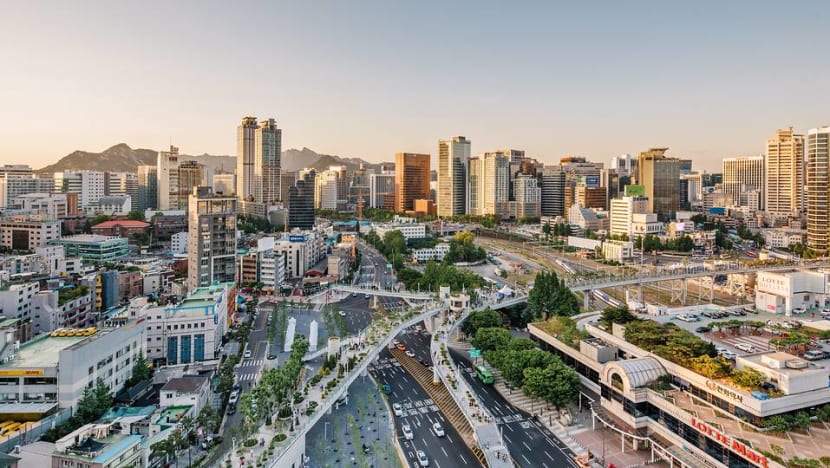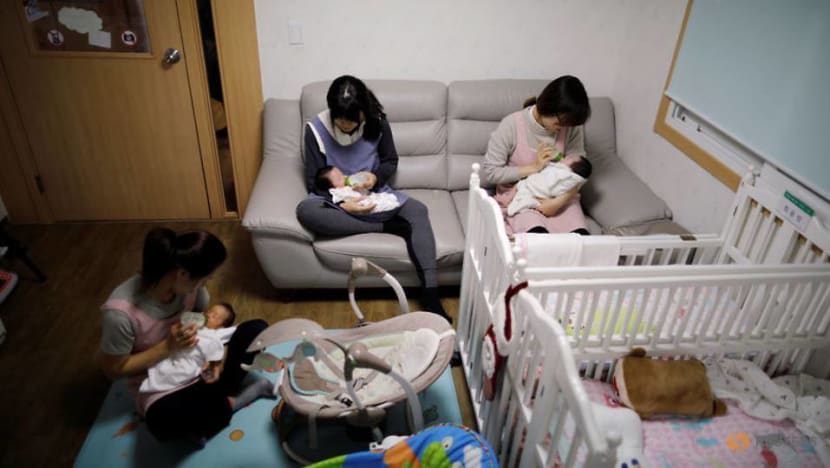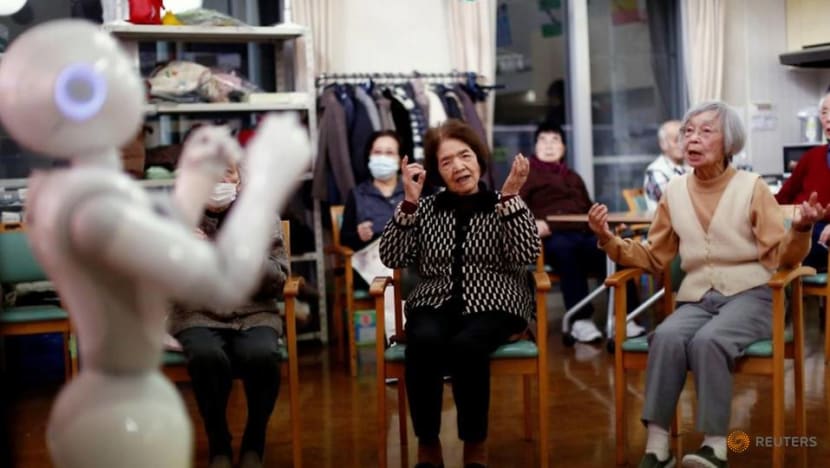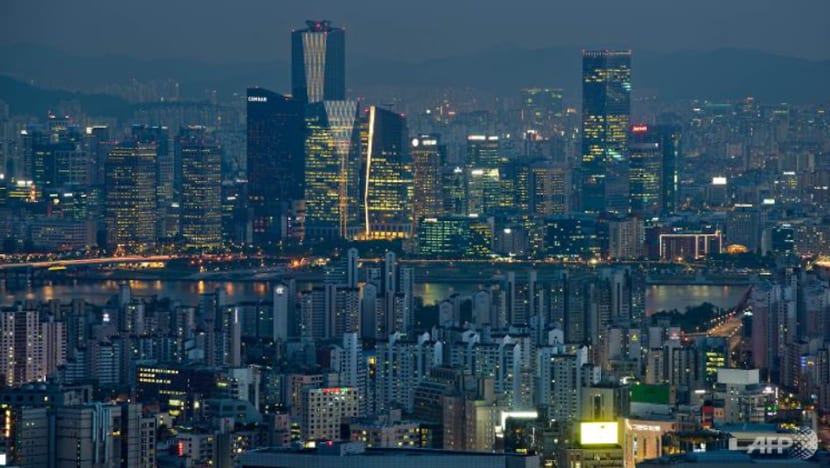commentary Commentary
Commentary: What happens when a megacity shrinks? It's Seoul's fate come 2020
The South Korean city may lose its megacity status next year. A city with fewer people can be challenging but that is a future to be confronted bravely, says Steven Borowiec.

Overview of Seoul, including Seoullo 7017 – a lushly planted elevated walkway with activities along the way. (Photo: Seoul Metropolitan Government)
SEOUL: A visitor to Seoul is unlikely to come away with the impression that the South Korean capital is a city that doesn’t have enough people.
Tall commercial and residential buildings loom on nearly every block, and the city’s sidewalks and roads are filled with traffic from morning until night.
If you climb any of the mountains that surround the city, the view of endless concrete sprawl is at once impressive and intimidating.
Regardless of where you are, the sounds of human activity - car engines, conversations - are almost inescapable.
PEAK POPULATION
Despite this reality, policymakers are grappling with the fact that the city’s population is shrinking, with more people dying than being born.
Having peaked at more than 10.5 million in 2010, over the next year, Seoul could lose “megacity status,” meaning that its population could fall below 10 million.
A decline in population clashes with how the Seoul government presents the city publicly, as a dynamic, desirable place to visit and live.
The city is constantly working to add services and attractions that make Seoul more comfortable for those who live here, and more enticing as a place for recreational or business travel.
The city is also investing a huge sum with the goal of becoming a music hub, that most youthful of cultural forms, driven by the astounding rise of K-pop and incredible success of boy band BTS.
READ: Commentary: BIGBANG Seungri’s sprawling scandal brings sexual misconduct secrets into the light

Behind the population decline is a demographic trend of overall ageing in South Korea, common to advanced economies. For years, people in developed countries have been living longer while having fewer children.
The average age of people living here is higher, and there will be fewer people of working age to care for the elderly in the not-too-distant future.
AGEING THREATEN POPULATION GROWTH
Analysis by the International Monetary Fund demonstrates how ageing populations can strain budgets with higher outlays for public pensions and healthcare.
The South Korean government presents these changes as threatening economic growth and has enacted a number of measures to encourage childbirth in recent years – most notably, free childcare and mandatory parental leave.
But so far, the measures haven’t stemmed the decline. Recent statistics, released last month, show South Korea’s birthrate at a record low.
READ: Commentary: In Japan, the old are harassing the young

HAND-WRINGING AND FOOT DRAGGING
A natural rejoinder to hand-wringing over population decline is to point out that we live in an era of growing scarcity, with melting ice caps and disappearing forests. Humans have inflicted permanent stress and contamination on ecosystems.
A key task of governance is effectively apportioning resources among members of a population. Maybe having fewer people competing for resources wouldn’t be so bad?
READ: Commentary: I care about climate change. I don't wish to live in a Waterworld like Kevin Costner
American economist Paul Krugman has written that “slower population growth indeed could and should be a good thing” but that taking advantage of demographic changes requires a kind of unorthodox policy making that is in short supply.
Krugman refers to what he calls a “bicycle effect,” which means that if an economy is not moving forward at sufficient speed, it will fall over.
The premise is that an economy must have constant growth to fuel new capital investment. If growth stalls, because of a decline in population, the economy can tank due to a lack of new investment.
ARRESTING POPULATION DECLINE
In response to a brewing crisis, the country’s finance ministry announced in September a plan to deal with population decline, specifically to maintain economic growth and prevent labour shortages.

READ: Commentary: Opening earlier and more - some senior care centres in Taiwan take service to new levels
It announced plans intended to inject funds to prop up small and medium-sized enterprises, where most South Koreans work, and encourage older people to remain in the workforce past the customary retirement age.
The ministry also outlined some loosening of South Korea’s strict immigration laws, by allowing qualified foreigners easier paths to remaining in the country for longer. Immigration is a natural solution to a problem like this.
If the government were to open a path for larger numbers of immigrants to work legally with a path to permanent residency, that could go a long way to solving labour shortages and would help prop up growth.
But there is no consensus in South Korea that large-scale immigration is desirable, and there isn’t likely to be one soon.
HEALTHCARE CHALLENGES
Beyond the economy, an age distribution more skewed to the elderly creates healthcare challenges. In South Korea, social norms have traditionally dictated that care for elderly relatives is handled within the family, with a minimal role for the state.
READ: Commentary: Meet Sofia, the 67-year-old widow who uses Pokemon Go to fight depression
Both the public and private sectors are hoping machines and artificial intelligence technology can fill this void.
The health ministry is investing millions in the development of robots that can assist elderly people with limited mobility.
Researchers are developing robots that can hold basic conversations with people suffering from dementia, thereby providing a bit of companionship that could stem cognitive decline.

Like so much about the tech industry, it sounds both ingenious and sad. While robots can provide company to old folks, it is nevertheless sad to think of anyone having to rely on a robot for companionship.
ACCEPTING A WORLD WITH FEWER PEOPLE
The news about Seoul isn’t all bad. In some ways it’s an alright place to be old.
Due to its density, the city is walkable. Most people can, within a short distance, find a pharmacy, a grocery store and connections to Seoul’s broad network of public transportation, which is free for elderly people.
READ: Commentary: Navigating the new road to modern elderhood
The city has a wide network of hiking trails where elderly people can spend time, enjoy the sights and exercise for free.
I have hiked those trails, and have many times marvelled at the vigor of people more than twice my age who are engaged in far more challenging hikes.

Seoul’s population decline is another sign that the world is changing in ways we aren’t comfortable with, but must confront.
Our world is capable of supporting fewer people. While it may seem unnatural, now is the time to accept the reality of fewer people being born – in Seoul and elsewhere around the world experiencing an ageing, shrinking population.
Steven Borowiec is the politics editor of Korea Expose.












